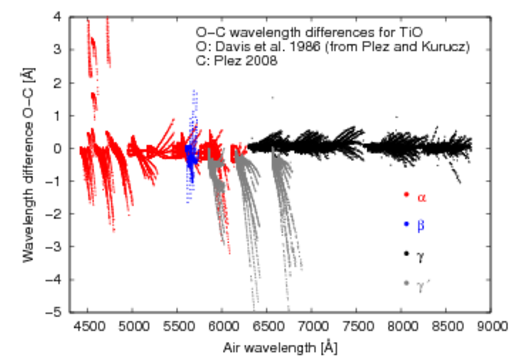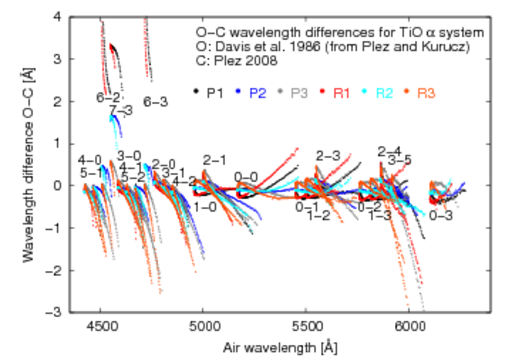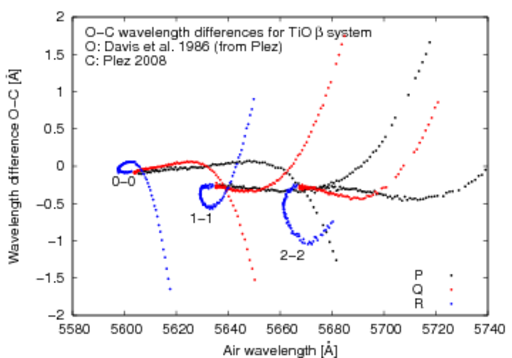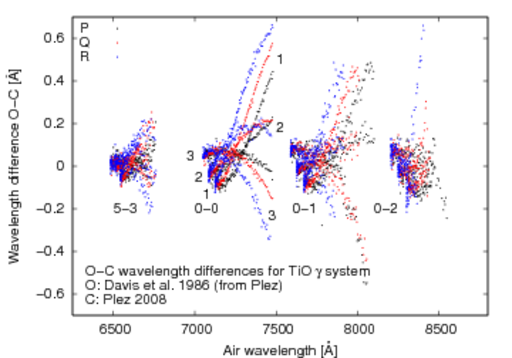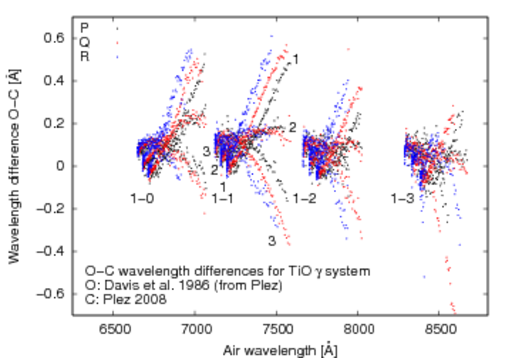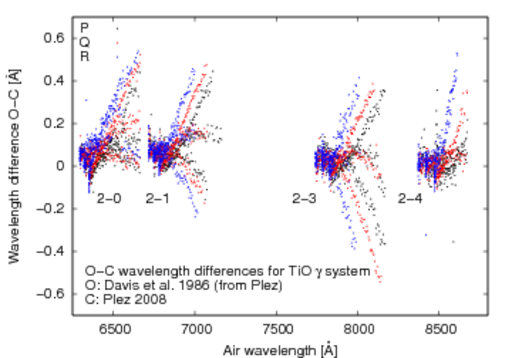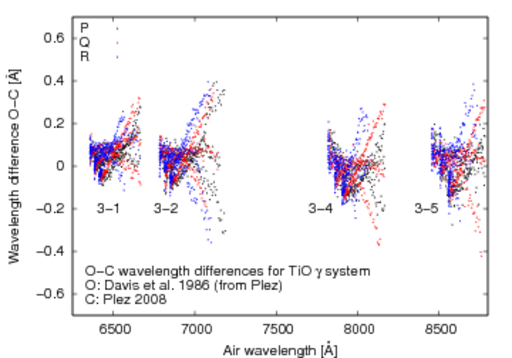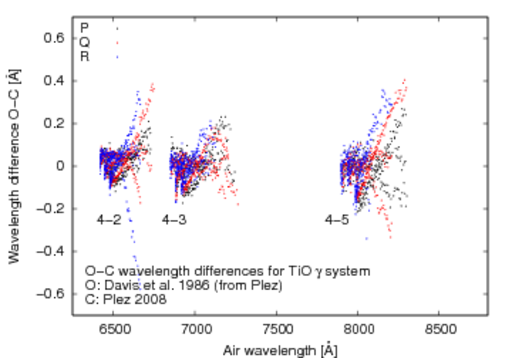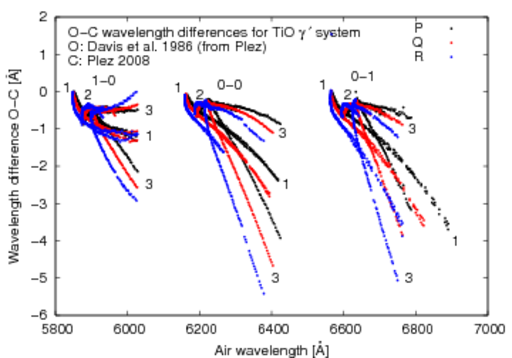TiO data - see also TiO/LambdaDoubling
Contents
Next steps
- Extract TiO line lists for use with e.g. Synth
- Calculate synthetic spectra
- Compare with observed spectra of M dwarfs and giants
Done:
- UH, 2012-05-04: Modified species number in Schwenke and Plez_Phillips TiO VALD3 files.
- UH, 2011-05-31: Processed Schwenke TiO line list.
UH, 2011-02-15, 2011-03-13, 2011-05-26, 2011-05-31, 2012-05-04: Converted ascii TiO line lists to (new) VALD3 binary format - see /vald-archive/source-lists/Molecules/TiO/ for scripts, log files, format file, and binary lists; kompressed lists in CVALD3 format are in /home/vald/VALD3/VALD3/CVALD3/MOLECULES/ .
Summary of files
Calculated line lists:
Plez:
/vald-archive/source-lists/Molecules/TiO/Plez/
Original lists (Plez 2008/2009): linelist??_all.dat.gz
Lists processed for non-resolved lambda doubling (Heiter 2009): linelist??_all_nodoubling.dat.gz
Merging code: tio_plez_rm_doubling.pro
Schwenke:
/vald-archive/source-lists/Molecules/TiO/Schwenke/
Original lists (Kurucz 1999): tioschwenke.bin, eschwenke.bin
Lists processed for non-resolved lambda doubling and stored in ascii format (Heiter 2011): tioschwenke??.dat.gz
Merging code: rschwenk-vald.for
Line lists with observed wavelengths:
/vald-archive/source-lists/Molecules/TiO/Phillips/
Original list: TiO-Phillips-OBS-Plez-Kurucz.dat
Converted list (ascii format, same format as calculated lists): linelist48-TiO-Phillips-OBS-vald.asc
Conversion code: tio_phillips_to_vald_ascii.f
File with O-C wavelength differences: TiO-Phillips-O-C.dat
Gnuplot input file to plot O-C
TiO electronic states
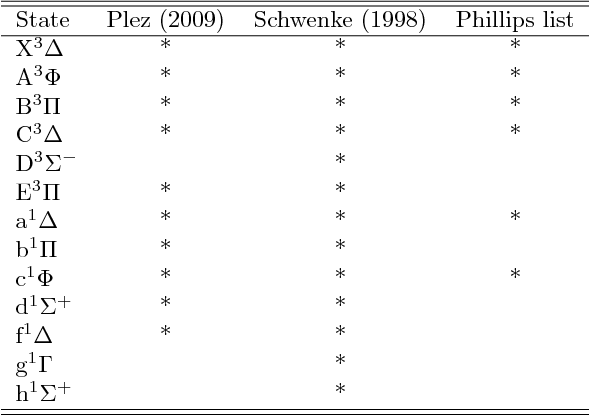
Calculated TiO data from Plez
TiO line lists were calculated by Bertrand Plez with air wavelength, gf, energies for lower and upper levels, radiative damping constant, transition id and quantum numbers.
Version history:
- 29 May 2008 - Created.
- 10 June 2009 - The phi system was added, and the radiative damping constants for the delta system were changed.
- 7 Mar 2012 - The wavelengths of the delta system's 0-0 and 1-1 transitions were corrected, using improved molecular constants from Ram et al. 1996, ApJS 107, 443.
Transitions:
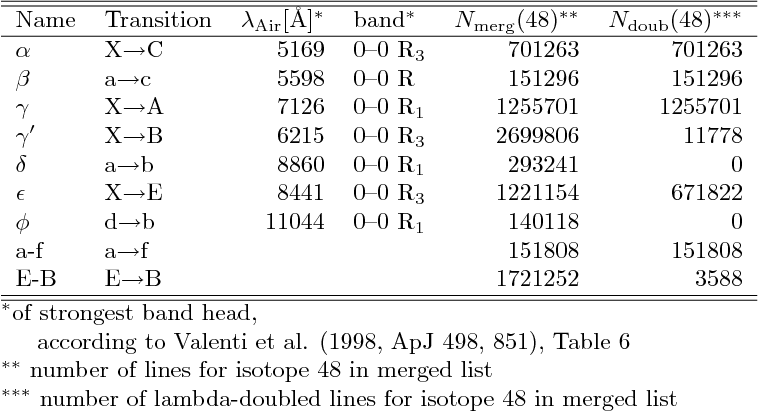
Vibrational quantum numbers from 0 to 15, rotational quantum numbers from 1 to 200.
The original line lists have been processed to merge non-resolved lambda-doubled lines (with equal wavelengths) by UH (2009-02-06, 2009-06-30), see page on lambda doubling. In the calculated lists, parity is given by the syml and symu quantum numbers, which can be 1 or -1. In the merged lists, syml and symu are set to 0 for the merged lines. For further information on the level data format see EnergyLevels.
For gamma prime, delta, epsilon and E-B, lambda doubling is resolved (transitions involving E3-Pi, B3-Pi, and b1-Pi states), therefore there are few merged lines. For the phi transitions, lambda doubling does not exist (involves a Sigma state). For the remaining transitions (alpha, beta, gamma, a-f), lambda doubling is not resolved (therefore, all lines are merged).
Number of lines:
Isotope |
Nmerg |
Norig |
46 |
8333340 |
11280189 |
47 |
8334680 |
11281575 |
48 |
8335639 |
11282895 |
49 |
8336542 |
11284157 |
50 |
8337372 |
11285088 |
total |
41677573 |
56413904 |
Norig ... original lists
Nmerg ... non-resolved lambda-doubled lines merged
Calculated TiO data from Schwenke (1998)
The TiO linelist described by Schwenke (1998, Faraday Discussions 109, 321) and published on Kurucz CDROM No. 24 (1999) was obtained from the Kurucz website in Sep 2004. It contains wavelength, gf values, energies for lower and upper levels, radiative damping constant, level id and quantum numbers, for transitions among 13 different electronic states of TiO (five different Ti isotopes). The list for isotope 48 contains lines for 70 different electronic transitions (the nine "allowed" transitions as in the Plez list, and numerous "forbidden" transitions, see discussion in Schwenke 1998 and table below). Figure 4 in Schwenke (1998) shows the absorption as a function of frequency at 3000 K for 27 of the "forbidden" systems.
Transitions:
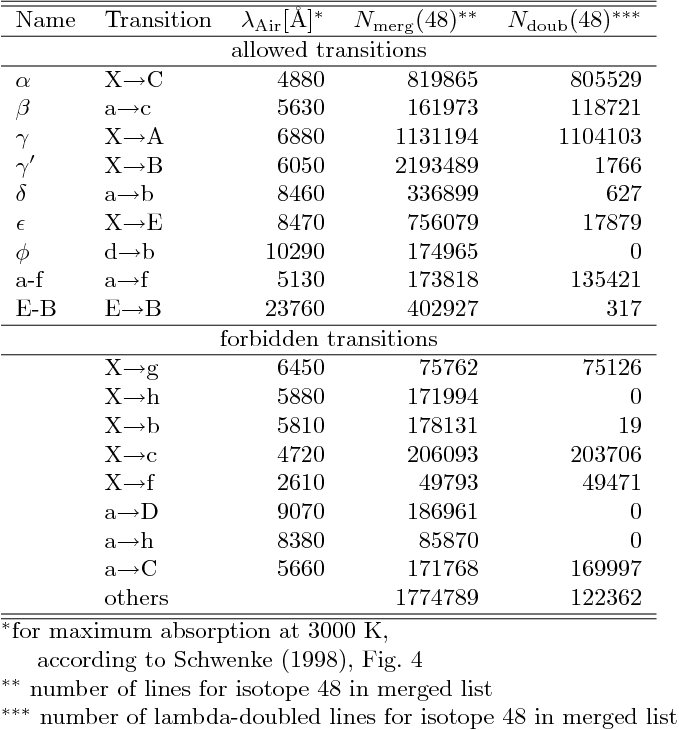
Vibrational quantum numbers from 0 to 19, rotational quantum numbers from 1 to 300.
The original line lists have been processed to merge non-resolved lambda-doubled lines (with equal wavelengths) by UH (2011-05-30), see page on lambda doubling. In the calculated lists, parity is given as 'p' or 'm'. In the merged lists, parity is set to 0 for both upper and lower level for the merged lines. For further information on the level data format see EnergyLevels.
Number of lines:
Isotope |
Nmerg |
Norig |
46 |
4713961 |
6410067 |
47 |
4738024 |
6441278 |
48 |
9052370 |
11857414 |
49 |
4782693 |
6503728 |
50 |
4804039 |
6532011 |
total |
28091087 |
37744498 |
Norig ... original lists
Nmerg ... non-resolved lambda-doubled lines merged
Observed wavenumbers
A line list with observed wavenumbers from Phillips has been provided by Bertrand Plez (priv. comm. 17 Sep 2008, 14 May 2009). Reference: Davis et al. 1986, ApJ 309, 449.
It contains 35584 lines in the alpha, beta, gamma, gamma prime systems.
The same data have also been retrieved from the Kurucz website: http://kurucz.harvard.edu/molecules/TiO/tioberkeley.dat
This file was found to contain data for eight additional vibrational bands in the alpha system (3198 lines), and these were added to the data obtained via Plez.
In total, the data cover the following wavelength range:
wavenumber(cm-1) |
wavelength(Å) |
|
|
vacuum |
air |
22610.30 |
4422.763 |
4421.521 |
11383.24 |
8784.845 |
8782.433 |
Isotope: 48Ti (see Davis et al. 1986, IV.a p. 452)
The list has been converted to an ascii format where the observed wave numbers have been converted to air wavelengths and all other line data needed for a VALD line list have been taken from the calculated list by Plez (isotope 48, merged, see above), by UH, 2009-05-22, 2011-05-26.
Lambda doubling is resolved in the observations only for the gamma prime system (P,Q,R 1/2 branches). "The Lambda-split components are designated by the usual subscripts c and d, which are assigned arbitrarily since the symmetry is unknown" (Phillips, 1969, ApJ 157, 449). Calculated data have been assigned to Lambda-doubled components according to wavelength order.
Number of lines and wavelength ranges for converted list:
System |
N |
Air wavelength range [Å] |
|
A |
11942 |
4421 |
6277 |
B |
826 |
5597 |
5740 |
G |
21071 |
6294 |
8783 |
H |
5254 |
5847 |
6891 |
Total |
39093 |
|
|
Explanation for different numbers of lines in original and converted list:
173 lines in systems other than gamma prime are not in the calculated list (all with Jlow<=4).
- In the alpha and gamma systems, there are five "double" lines with same quantum numbers and branch names but slightly different wavenumbers. The wavenumbers for these have been averaged for the converted list. There are 19 double lines with exactly the same parameters. The duplicates have been removed for these.
- There are 137 gamma prime P11/Q11/R11 lines, which are not in calculated list and have been discarded.
- 290 gamma prime PQR 1/2 lines have been discarded, where only one component (C or D) is in the observed list.
There is a double entry for gamma prime 0-1 Jlow=7 R1D.
For 20 lines in the gamma prime P1,Q1,P2,Q2,R2 lists, lambda doubling is not resolved in the calculated list. The observed wavenumber differences are very small for these lines (<=0.05 cm-1, >0 only for four lines), therefore they have been averaged.
The double line gamma prime 0-1 Jlow=1 R2 is not in the calculated list.
- P3,Q3,R3 lines in the gamma prime system are "double", because of resolved lambda doubling in the calculated list (+958 lines).
- Totals: -647 +958
Observed lines in beta system
v-v |
branch |
Jlow,min |
Jlow,max |
Jlow missing |
|
|
|
|
|
0-0 |
P |
4 |
99 |
94 |
1-1 |
P |
2 |
100 |
66,88,91,92,93,95 |
2-2 |
P |
2 |
90 |
8,10,12,14,76,81,83 |
|
|
|
|
|
0-0 |
Q |
2 |
100 |
4 |
1-1 |
Q |
1 |
100 |
2,4,96 |
2-2 |
Q |
3 |
100 |
7,78,82,83,84,89,90,91 |
|
|
|
|
|
0-0 |
R |
2 |
100 |
|
1-1 |
R |
2 |
98 |
7 |
2-2 |
R |
2 |
92 |
5,26,42,62,64,70,74,75,84 |
Observed lines in gamma prime system
see also TiO/LambdaDoubling
observed lines in gamma prime system, P1,Q1,R1 branches (C/D pairs for each v-v and Jlow), Jlow values:
vupp-vlow |
branch |
Jlow,min |
Jlow,max |
Jlow missing C+D |
Jlow missing C |
Jlow missing D |
|
|
|
|
|
|
|
0-0 |
P1 |
3 |
131 |
|
3,4,5,6,13,23 |
29,104,130,131 |
1-0 |
P1 |
2 |
107 |
98 |
21,77 |
15,63,103,107 |
0-1 |
P1 |
2 |
145 |
89,93,109,110,120,123 |
2,10,14,28,29,63,104, 126,131,135,138,139, 140,144,145 |
23,62,68,71,72,77,84,98, 99,111,125,129,130,136 |
|
|
|
|
|
|
|
0-0 |
Q1 |
1 |
141 |
2 |
1,12,119,138,139,140,141 |
4,7,118 |
1-0 |
Q1 |
1 |
120 |
|
1,104,105,112,114,118 |
|
0-1 |
Q1 |
2 |
144 |
94,138 |
11,104,107,114,125,127, 128,129,130,132,133,143,144 |
8,77,100,102,122,124 |
|
|
|
|
|
|
|
0-0 |
R1 |
1 |
122 |
96 |
5,6,19,64,87 |
1,2,76,83,84,90,94,100, 107,>=110 |
1-0 |
R1 |
1 |
135 |
126 |
28,43,78,82,95 |
116,119,121,128,131 |
0-1 |
R1 |
1 |
150 |
119,122,124,148 |
22,58,78,87,100,105,106, 108,111,114,115,130, 137,>=144 |
5,38,39,53,81,103,116, 117,121,125,128,141 (7 double) |
observed lines in gamma prime system, P2,Q2,R2 branches (C/D pairs for each v-v and Jlow), Jlow values:
vupp-vlow |
branch |
Jlow,min |
Jlow,max |
Jlow missing C+D |
Jlow missing C |
Jlow missing D |
||
|
|
|
|
|
|
|
|
|
0-0 |
P2 |
11 |
106 |
16 |
|
51, >=85 |
||
1-0 |
P2 |
3 |
88 |
|
3,4,6,15,34,35 |
5,16,82,88 |
||
0-1 |
P2 |
5 |
90 |
7,9,13,16,85 |
60,67 |
69,71,74,76, >=84 |
||
|
|
|
|
|
|
|
|
|
0-0 |
Q2 |
7 |
107 |
28 |
|
>=84 |
||
1-0 |
Q2 |
2 |
91 |
|
90 |
<=9, 35,74,91 |
||
0-1 |
Q2 |
4 |
85 |
8,19,75,82,84 |
78 |
72,76,79,80,83,85 |
||
|
|
|
|
|
|
|
|
|
0-0 |
R2 |
11 |
106 |
19,27,32,83,96,97 |
|
48,80, >=82 |
||
1-0 |
R2 |
4 |
90 |
|
18,36,81 |
4,5,6,8,22,25,37,41,50,61,75,89,90 |
||
0-1 |
R2 |
1 |
91 |
88 |
18,20,67,76 |
44,48,82,83, >=85 |
observed lines in gamma prime system, P3,Q3,R3 branches:
vupp-vlow |
branch |
Jlow,min |
Jlow,max |
Jlow missing |
|
|
|
|
|
0-0 |
P3 |
4 |
121 |
10,14,19,31,68 |
1-0 |
P3 |
7 |
95 |
63,89,93 |
0-1 |
P3 |
4 |
103 |
7,19,20,52,79,82,93,97 |
|
|
|
|
|
0-0 |
Q3 |
11 |
130 |
|
1-0 |
Q3 |
4 |
109 |
5,10,14,17,19 |
0-1 |
Q3 |
6 |
112 |
10,25,54,87,94,102,104,110 |
|
|
|
|
|
0-0 |
R3 |
11 |
139 |
21,25,30,65,77,118,119,123,124,134,138 |
1-0 |
R3 |
5 |
124 |
99,100,103,119,122 |
0-1 |
R3 |
3 |
127 |
5,14,20,70,94,95,96,98,100,113,123 |
Comparison of observed and calculated wavelengths
Differences between observed and calculated wavelengths, O-C: min=-5.4Å, max=4.0Å.
O-C wavelength differences versus observed air wavelength for each system:
